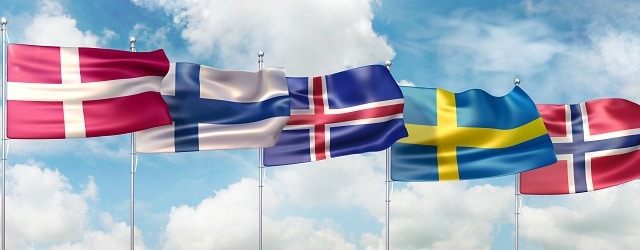Despite the $30 billion in crisis support packages being provided by governments to help keep businesses viable and protect manufacturing output, COVID-19 has left leading top Nordic corporations hurting.

The short-term outlook remains grim for Nordic economies and corporations struggling to find the least painful route out of the COVID-19 crisis. States are rolling-out their phase-one pandemic exit strategies in a bid to return their economies to pre-pandemic lockdown growth levels.
Sweden—which bucked the European norm in deciding not to put its economy in to a complete lockdown—is hoping its maverick virus curve flattening game-plan will soften the economic blow of the pandemic which threatens to contract GDP growth and cause a surge in unemployment rates. GDP is forecast to contract by between 7%-10% in Sweden, Finland, Norway and Denmark in 2020, while jobless rates are expected to hover between 6%-8% during the same period.
Despite the $30 billion in crisis support packages being provided by governments to help keep businesses viable and protect manufacturing output, COVID-19 has left leading top Nordic corporations hurting. Some of those global corporates, including Lego and Carlsberg, have shifted part of their surplus manufacturing capacity to produce hand sanitizer and protective surgical face masks for frontline medical workers.
The pandemic-driven downturn has sparked a swell of cost-reduction programs and bankruptcies across all industries. Volvo, Scandinavian Airlines, Nokia and Nordic retail giant Stockmann are among the companies implementing cost-savings and layoff plans. In Norway, high street fashion house Brandstad and Wagner shuttered its chain of 30 stores.
The sharp decline in revenue has left some Nordic corporations feeling more than a little insecure. Facing a substantial drop in income in 2020, Nokia has reportedly turned to financiers to boost its capital reserve war-chest to $18 billion in order to fight off possible hostile takeover bids.
The loss of earnings is also producing a heightened level of borrowing activity among companies looking to shore-up their finances in preparation for future COVID-19 impacts. Mining and recycling group Metso beefed up its capital reserves by $313 million by way of new a funding and revolving credit facilities’ arrangement with lenders Nordea, Commerzbank OP Corporate Bankc, SEB and Standard Chartered Bank.
The COVID-19 pandemic could wipe-out 20 years of economic growth in the Finnish economy warned Risto Murto, CEO of Varma Mutual Pension Insurance. “There is a risk that this won’t end well. In real terms, Finland’s GDP will drop below its 2008 level. If the rate of recovery is as subdued as it was after the 2008 financial crisis, Finland could lose up to 20 years of economic growth,” Murto said.
Post-pandemic economic recovery prospects in Norway are complicated by the significant slump in world oil prices, a general fall-off in business and the cancellation of orders within core sectors like offshore engineering, transport, tourism and IT.
Otherwise profitable Norwegian companies are facing serious short-term challenges, said Harald Serck-Hanssen, Executive Vice President of Corporate Banking at DNB, the principal lender to one-third of Norway’s enterprises.
“Viable companies need support through this crisis. Financially healthy companies are experiencing canceled orders and lost business from subcontractors. These are challenges that can be eased using short-term measures such as long-term credit repayment periods or overdraft facilities,” Serck-Hanssen said.
In Finland, corporations facing financial distress can apply for temporary VAT rebates that incur a 3% interest rate on repayment in 2021. Approximately $215 million is available to small and medium-sized firms to support their salary and debt obligations. However, the Finnish government’s ability to expand its crisis support package for the business sector is constrained by the prospect of a soaring deficit in government finances that is expected to reach $15 billion, or 7.2% of GDP, in 2020.
The Swedish government’s $6 billion aid package for companies impacted by COVID-19 includes a direct support provision for employers that have lost at least 30% of their income due to the pandemic. State funding here aims to cover losses up to 75% of fixed costs, excluding wages, to a maximum individual payout amount of $15.3 million.
Denmark was the first Nordic economy to implement a comprehensive business support plan for companies affected by the pandemic. The latest estimates suggest that up to $36 billion in state supports may be needed to see the economy fully through the COVID-19 crisis. The government’s business aid package includes a special interest free loan scheme for small and medium enterprises that is based on VAT and payroll tax payments. Over 26,000 Danish firms have applied for loans under the scheme.



